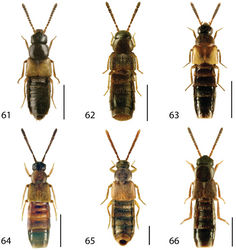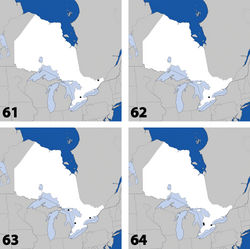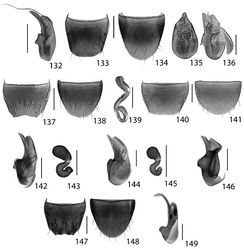Atheta alesi
| Notice: | This page is derived from the original publication listed below, whose author(s) should always be credited. Further contributors may edit and improve the content of this page and, consequently, need to be credited as well (see page history). Any assessment of factual correctness requires a careful review of the original article as well as of subsequent contributions.
If you are uncertain whether your planned contribution is correct or not, we suggest that you use the associated discussion page instead of editing the page directly. This page should be cited as follows (rationale):
Citation formats to copy and paste
BibTeX: @article{Brunke2012ZooKeys186, RIS/ Endnote: TY - JOUR Wikipedia/ Citizendium: <ref name="Brunke2012ZooKeys186">{{Citation See also the citation download page at the journal. |
Ordo: Coleoptera
Familia: Staphylinidae
Genus: Atheta
Name
Atheta alesi Klimaszewski & Brunke sp. n. – Wikispecies link – ZooBank link – Pensoft Profile
Type locality
Canada, Ontario, Ottawa Div., Ottawa, Central Experimental Farm, Marmota burrow.
Type material
Holotype (male): CANADA: ON: Ottawa, Centr. Exp. Farm, Marmota burrows, 20.iv.2009, A. Smetana leg. (LFC).
Paratypes (6 males, 8 females): 13 with same data as holotype: (2 male, 5 female, CNC; 4 male, 2 female, LFC); Waterloo Reg., Blair, 43.37 -80.39, hedgerow, canopy trap, 19.v.2009, A. Brunke, 1 female (DEBU).
Diagnosis
This species may be distinguished from all other Atheta (Microdota) species by the following combination of characters: body dark brown with legs, 2–3 basal antennomeres and elytra yellowish; forebody strongly glossy and with microsculpture; distal antennomeres only moderately transverse; male tergite VIII with distinctive shallow and wide emargination (Fig. 137), median lobe of aedeagus in lateral view with large bulbus and straight tubus (Fig. 136), internal sac in lateral view with distinctive, large, curved sclerite that is bifurcate basally (Fig. 136); and spermatheca S-shaped, with elongate, tubular capsule that bears a moderately long and broad apical invagination, stem sinuate and apically looped (Fig. 139).
Description
Body small, length 2.4–2.6 mm, narrowly subparallel, forebody with strong meshed microsculpture and strongly glossy, abdomen strongly glossy and with moderately sparse pubescence; head, pronotum and abdomen dark brown, elytra, legs and antennomeres 2–3 yellowish; head subquadrate, flattened and slightly impressed medially, with postocular area at least as long as diameter of eye, eyes large and slightly protruding, pubescence directed inwards in central part of disc; antennae slender, antennomeres 1–3 strongly elongate, 4–5 subquadrate, 6–10 moderately transverse, apical antennomere strongly elongate, longer than 9–10 combined; pronotum moderately transverse, margined laterally and posteriorly, pubescence radiating laterad and obliquely posteriad from the midline of disc, with 4 macrosetae close to lateral margin; elytra slightly elongate, at suture longer than pronotum, pubescence directed obliquely latero-posteriad; abdomen subparallel, tergites III to V with basal impression; legs moderately elongate.
Male. Tergite VIII truncate apically and with shallow, wide emargination (Fig. 137); sternite VIII rounded apically or sometimes slightly pointed medially (Fig. 138); median lobe of aedeagus with large, broad bulbus and short triangular tubus in parameral view; in lateral view, tubus straight ventrally and narrowly rounded at apex (Fig. 136); internal sac in abparameral view with distinct structures as illustrated in Fig. 135, internal sac in lateral view with distinctive curved sclerite that is bifurcate basally (Fig. 136).
Female. Tergite VIII truncate apically (Fig. 140); sternite VIII rounded and slightly pointed medially (Fig. 141); spermatheca S-shaped, with elongate, tubular capsule that bears a moderately long and broad apical invagination, stem sinuate and apically looped (Fig. 139).
Distribution
Atheta alesi is currently only known from Ontario but is expected to occur broadly across eastern North America.
Bionomics
Nearly all specimens were collected from debris in groundhog (Marmota monax (L.)) burrows. Atheta alesi may be another member of the rich insect assemblage associated with groundhog burrows but further collections in this microhabitat are needed to confirm this. Although one specimen was collected in a raised pan trap placed in an agricultural hedgerow, other groundhog-associated staphylinids were collected in this series including Aleochara ocularis Klimaszewski and Bisnius pugetensis (Hatch).
Etymology
This species is named in honor of Dr. Aleš Smetana, Ottawa, Ontario, Canada, in recognition of his excellent collections from groundhog (Marmota monax (L.)) burrows, which have revealed many interesting species that may be restricted to this microhabitat (e.g. species in Klimaszewski 1984[1], Smetana 1971[2], 1995[3]).
Comments
This species is tentatively assigned to the subgenus Microdota based on the following combination of characters present in other Canadian species: small body size, antennomeres 6–10 subquadrate to moderately transverse, Y-shaped ligula, simply formed median lobe of the aedeagus and overall shape of the spermatheca. Atheta (Microdota) alesi is most similar externally and in sexual characters to the type species of Microdota, Atheta (Microdota) amicula (Stephens), which has become introduced into North America. The new species can be separated from Atheta amicula by the longer apical antennomeres (strongly transverse in Atheta amicula), the straight ventral surface of the tubus in lateral view, the differently shaped sclerites of the internal sac in lateral view and the narrower capsule of the spermatheca. The sexual characters of Atheta amicula are illustrated in Klimaszewski et al. (2011)[4].
Original Description
- Brunke, A; Klimaszewski, J; Dorval, J; Bourdon, C; Paiero, S; Marshall, S; 2012: New species and distributional records of Aleocharinae (Coleoptera, Staphylinidae) from Ontario, Canada, with a checklist of recorded species ZooKeys, 186: 119-206. doi
Other References
- ↑ Klimaszewski J (1984) A revision of the genus Aleochara Gravenhorst of America north of Mexico (Coleoptera: Staphylinidae, Aleocharinae). Memoirs of the Entomological Society of Canada No. 129: 1-211. doi: 10.4039/entm116129fv
- ↑ Smetana A (1971) Revision of the tribe Quediini of America North of Mexico (Coleoptera: Staphylinidae). Supplementum. The Canadian Entomologist 103: 1833-1848. doi: 10.4039/Ent1031833-12
- ↑ Smetana A (1995) Rove beetles of the subtribe Philonthina of America north of Mexico (Coleoptera: Staphylinidae). Classification, phylogeny and taxonomic revision. Memoirs on Entomology, International 3: 945.
- ↑ Klimaszewski J, Langor D, Pelletier G, Bourdon C, Perdereau L (2011) Aleocharine beetles (Coleoptera, Staphylinidae) of the province of Newfoundland and Labrador, Canada. Pensoft Publishers, Sofia, Moscow, 313 pp.
Images
|


